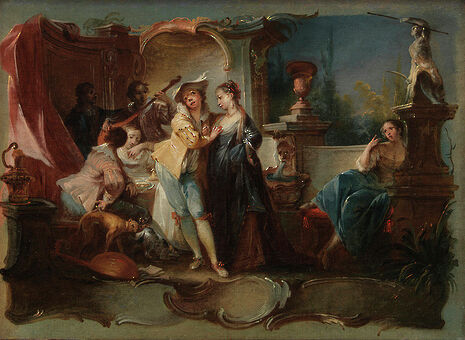Our generation: redefining prostitution?
The rise of ‘mutually beneficial’ sexual relationships is blurring the boundaries between romantic partnership and prostitution, says Morwenna Jones

D.H. Lawrence’s essay ‘On Pornography and Obscenity’, opens with the question, “what is a harlot?” His answer: “If she was a woman who took money from a man in return for going to bed with him - really, most wives sold themselves, when they felt like it, for nothing”. Accusing wives of having sold themselves on the cheap, Lawrence goes on to say “If a woman hasn’t got a tiny streak of harlot in her, she’s a dry stick as a rule.”
Nowadays, we reel from this in horror. We no longer seek to be either the giver or the receiver in our relationships – we expect to be both. If we are lucky enough to be seeing someone who does have money coming out of their ears, we don’t expect to be showered with gifts. We buckle up and set ourselves the challenge of fending for ourselves.
Yet, scratch the surface of our society’s views on relationships and it appears that sexually, we haven’t moved on from Lawrence’s evaluation of 1920s ‘harlots’. The only difference is that our generation is redefining what it means to be a ‘harlot’ or, to use the non-archaic term, ‘prostitute’, meaning that capitalising on your body or appearance is increasingly socially acceptable.
The most obvious example of this redefinition is taking place is in the US, where Elizabeth Raine (not her real name) is auctioning her virginity online. On her website, the 27 year-old describes herself as ‘exceptionally well educated, financially independent, and entirely willing to lose my virginity in this manner’. A medical student from a wealthy family, she is offering men from around the world the chance to bid for a twelve-hour date, during which they may take her virginity.
With bidding currently at $130,000, it looks like a great way to raise a lot of money quickly – something any student with substantial loans would die for. Elizabeth’s education is a significant factor. Not only a virgin, she’s an intelligent young woman who has rationally thought through selling her virginity, and effectively lessened the guilt of her potential bidders. Rather than taking advantage of a woman who has no other option, they’re engaging in a mutually beneficial deal, on an equal footing, with a partner who has reflected on their engagement as much as they have.
The phrase ‘mutually beneficial relationship’ also happens to be the slogan of SeekingArrangement.com, the world’s most popular ‘Sugar Daddy’ dating site. For members, it offers ‘Sugar Daddies’ (and ‘Sugar Mommies’) the chance to date beautiful, young, ambitious women, and ‘Sugar Babies’ the chance to date wealthy, affluent, powerful men or women.
But it’s not just dating. The site also prides itself on the fact that many ‘Sugar Daddies’ have helped their ‘Sugar Babies’ with tuition fees and now the site is being increasingly criticized for ‘pay per date’ arrangements. To assume that sex isn’t a principal consideration in ‘sugar’ relationships, or that they’re based purely on intelligence, is nothing other than naïve.
Seeking Arrangement is specifically defined as a ‘dating’ site having nothing to do with whatever occurs between two consenting adults, though it differs from Elizabeth Raine’s virginity auction in only one area: rhetoric. Whereas Seeking Arrangement coined the phrase ‘mutually beneficial arrangements’, one of the first phrases to appear on elizabeth-raine.com are the words ‘I have made the decision to auction off my virginity’.
It seems fitting to ask where the real difference is, or even which is worse. On the one hand, Seeking Arrangement offers the chance to enter into an ‘arrangement’ in return for mental, emotional and, crucially, financial support. On the other, Raine has openly made the decision to profit from her virginity.
So, what about what they have in common? In both instances, people are capitalising on their appearance by exchanging a relationship, whether sexual or not, in return for what are generally financial gains. It has led to arrangements – both sexual and romantic – becoming priced and valued.
This says something important about how we see relationships today. The term ‘trophy-wife’ is thrown around today as an object of scorn, yet our university has the fourth highest number of ‘sugar babies’ in the UK. We shrink in disgust at the prospect of being completely reliant on the financial strength of another, but that changes when we see it as a transactional ‘arrangement’ as opposed to a relationship in which we depend on our other-half.
Ours is the age in which ‘sexual activity’, be it sex or a relationship, is on the auction block. We capitalise on our appearance and our time and company is available in exchange for ‘pampering’ and ‘support’.
As Lawrence says, not to have a trace of harlotry in oneself is to be ‘as dry as a stick’. But if it’s a choice between climbing the ladder of life using my face and my features or being a dry stick then, call me old-fashioned but I’d rather be a stick and get by on my own.
 News / Eight Cambridge researchers awarded €17m in ERC research grants27 December 2025
News / Eight Cambridge researchers awarded €17m in ERC research grants27 December 2025 News / Downing investigates ‘mysterious’ underground burial vault 29 December 2025
News / Downing investigates ‘mysterious’ underground burial vault 29 December 2025 News / News in Brief: carols, card games, and canine calamities28 December 2025
News / News in Brief: carols, card games, and canine calamities28 December 2025 Sport / Hard work, heartbreak and hope: international gymnast Maddie Marshall’s journey 29 December 2025
Sport / Hard work, heartbreak and hope: international gymnast Maddie Marshall’s journey 29 December 2025 Interviews / Meet Juan Michel, Cambridge’s multilingual musician29 December 2025
Interviews / Meet Juan Michel, Cambridge’s multilingual musician29 December 2025






